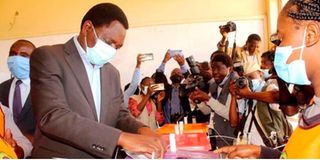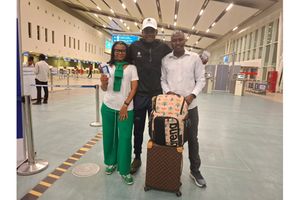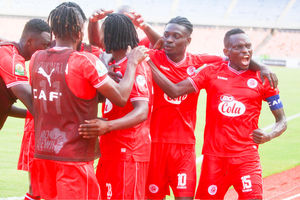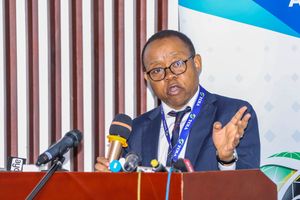President elect-Hakainde Hichilema faces huge task of reviving Zambia’s economy

United party for National Development (UPND) Presidential candidate Hakainde Hichilema casts his vote on Zambia’s general elections in Lusaka, Zambia on August 12, 2021 PHOTO| AFP
Zambia’s President- elect Hakainde Hichilema will have his work cut out as he takes office next Tuesday, following his landslide victory against the incumbent Edgar Lungu.
The 59-year-old business tycoon beat Mr Lungu who has been in power since 2015 with over 60 per cent of the vote.
His victory was seen as the people’s reaction to the incumbent’s economic mismanagement and the authoritarian leadership in the southern African country.
The new leader has his hands full after promising democratic reforms, a crackdown on corruption and rebuilding confidence among investors and improving the management of foreign debt that has thrown Zambia’s economy into the doldrums.
Mr Ringisai Chikohomero, a researcher at the South Africa based Institute for Security Studies (ISS), said President Lungu was ‘ousted’ by a protest vote. He said the incoming president has a tough task ahead of him.
“The opposition’s victory transcended the numerous lines of polarisation that have characterised voting patterns such as ethnicity, regional affiliation and age,” Mr Chikohomero said.
“Now (Mr) Hichilema will have to embody (Zambia’s founding father Kenneth Kaunda’s ‘one nation one Zambia’ slogan.
“With a mandate to lead for the next five years, (his) United Party for National Development (UPND) and the new president has his work cut out,” he added.
He believes President Lungu shot himself in the foot in the days before the polls.
“He abused the benefits of presidential power by deploying state-owned resources, stopping (Mr) Hichilema’s campaigns, and sending the army onto the streets to intimidate voters,” Mr Chikohomero added.
“This reminded Zambians of the threat that (President) Lungu posed to democracy when he arrested, detained and imprisoned (Mr) Hichilema in 2017,” he added.
The Patriotic Front (PF) leader, who first came into power following the death of Michael Sata, was accused of being autocratic after narrowly beating Mr Hichilema, popularly known as HH, in the 2016 presidential elections.
In the run-up to the August 12 elections, President Lungu used the Covid-19 pandemic to close the democratic space in Zambia and prevented the opposition from campaigning.
The army was deployed on the streets and the PF was accused of abusing state resources to campaign for him.
“More than a vote for (Mr) Hichilema, this election is a clear expression of frustration with (President) Lungu’s economic management – characterised by policy inconsistency, abandonment of economic fundamentals, accumulation of debt, and authoritarian tendencies,” the ISS said.
“The youth vote, which has been credited for the opposition’s victory, reflects the views of a population segment that has been increasingly marginalised and denied economic opportunities.
“Zambians have borne the brunt of the ruling Patriotic Front’s failures in the past 11 years and want tangible benefits, not political sloganeering.
“The president-elect has an enormous mountain to climb.”
In his election manifesto, Mr Hichilema, an economist, promised to turn Zambia into a middle-income economy through prudent management of the economy and tackling the debt crisis.
He will be seeking to win back the trust of the International Monetary Fund and the World Bank. The UPND leader believes his election will create confidence in the Zambian economy.
“We appreciate the confidence that the capital markets have in us as evidenced by the positive movements in our currency and Eurobonds,” Mr Hichilema tweeted on August 18.
The president-elect held meetings with newly elected independent Members of Parliament whose support he needs for his proposed reforms to succeed.
The UPND is seen winning most of the seats in the National Assembly. Results of the parliamentary elections that were held concurrently with the presidential elections are yet to be announced.
“I held a meeting with some of the independent MPs, who have expressed willingness to work with our administration,” Mr Hichilema said.
“We discussed various issues affecting their constituencies and pledged that we will work together to resolve them.”
Zambia’s economic crisis first came into the spotlight in November last year when the country defaulted on a $42.5 million repayment on a Eurobond.
President Lungu’s administration spent some of the loans on infrastructure that analysts say could soon turn into white elephants since the failing economy cannot sustain them.
On the eve of the August 12 polls, President Lungu commissioned the Simon Mwansa Kapwepwe International Airport in the country’s second largest city of Ndola and the commercial hub of its main copper producing region.
Government loan
The massive project cost $400 million and was financed through a government-to-government loan from China’s Export-Import Bank.
Aviation Industry Cooperation of China, which constructed the airport, said it has a 3.5-kilometre runway and the terminal could handle a million passengers per year.
Zambia’s external debt to gross domestic product ratio now exceeds 100 per cent and the country is defaulting on repayments.
The IMF was said to be reluctant to listen to the Zambian government’s plea for debt relief. Observers expect the lender to press for austerity measures as conditions for new loans for the incoming administration.
Zambia’s economy has been squeezed by Chinese debts. At some point, there were fears that the Asian country would take over the power utility, Zambia Electric Power Corporation.




